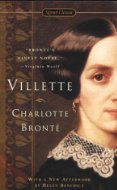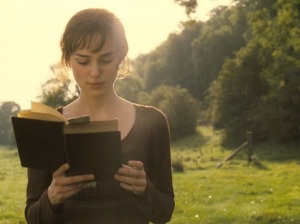 Charlotte Bronte’s novel tells the story of penniless Lucy Snowe who leaves a sorrowful past behind and starts a new life at a boarding school in the fictional city of Villette. There, she finds work as a teacher; she soon becomes successful and is admired by her pupils and colleagues. Furthermore, she attracts the attention of M. Paul Emanuel, the hot tempered and autocratic schoolmaster. The two eventually fall in love, but other protagonists want to keep them apart and finally manage to do so by sending M. Paul away. Nevertheless, he declares his love for Lucy before his departure and arranges for her to live an independent life as the headmistress of her own school. After three years of waiting, the couple is to be reunited.
Charlotte Bronte’s novel tells the story of penniless Lucy Snowe who leaves a sorrowful past behind and starts a new life at a boarding school in the fictional city of Villette. There, she finds work as a teacher; she soon becomes successful and is admired by her pupils and colleagues. Furthermore, she attracts the attention of M. Paul Emanuel, the hot tempered and autocratic schoolmaster. The two eventually fall in love, but other protagonists want to keep them apart and finally manage to do so by sending M. Paul away. Nevertheless, he declares his love for Lucy before his departure and arranges for her to live an independent life as the headmistress of her own school. After three years of waiting, the couple is to be reunited.
However, the ending of the novel is ambiguous, as Charlotte Bronte gives us two endings to choose from: We can see M. Paul and Lucy happily reunited or we can believe that M. Paul’s ship has been destroyed by a storm on his return to Villette and thus accept that he has drowned.
Many critics believe however, that the choice is in fact a delusion, since Lucy clearly states that those three years while she was waiting for her beloved and was leading an independent life at her own school were the happiest of her life. This statement suggests that M. Paul has died and that Lucy does not find romantic happiness like other Bronte heroines. However, what she does find is a fulfilled calling and independence. Lucy does not submit to a traditional female destiny (marriage and children), but has the opportunity to fulfil her own dream and thus finds happiness in her work. For that reason, Villette shocked many critics at the time it was published. Lucy is not like other Bronte or Austen heroines since she is neither rich nor beautiful and she does not marry her beloved; other characters in the novel see her as “inoffensive as a shadow” and pity her, but she is in fact a powerful character, a fighter and a rebel. Lucy may not be wealthy or beautiful, but she is clever and undergoes a major transformation; as the novel progresses, Lucy’s respect for herself grows and she manages to find the independence that allows her to be her true self. She also succeeds in winning M. Paul’s love with her intelligence and accomplishments and not with submissiveness or her looks. Throughout the novel, Lucy has to face many trials and has to struggle against the life she is expected to lead as a poor woman, but in the end, she finds autonomy and thus happiness. This is why the novel agitated so many readers and critics when it was published in 1853 and this also may be the reason why Virginia Woolf called Villette “Bronte’s finest novel”. Villette was seen as a scandalous novel in 1853, since it tells the story of a woman who loses love but finds independence.
Villette is Charlotte Bronte’s last novel and even though it may not be as popular as Jane Eyre, it is nevertheless regarded as her best work. The novel is not so much commemorated for its plot, but for Lucy’s character development and psychology. Charlotte Bronte is one of my favorite authors and Villette is a great novel! I recommend it to everyone who is interested in Victorian Literature and who likes to read about gender roles. However, you might find it difficult to read this book if you aren’t familiar with French, so make sure your edition has translations of the French phrases!








Sep 19, 2009 @ 18:35:03
No fair, Andreea! 😉 Now I have to go reread Villette, because your excellent review has pointed out all of the things that I missed or have forgotten. I do remember liking it, however, something about the way M. Paul leaves Lucy with a school of her own & how it led to her increased confidence & poise. Thanks!
Sep 19, 2009 @ 21:41:21
That is really an excellent review Andreea! I can tell you have alot of experience with this genre, and have analyzed it well. I don’t know much French, but still think I could work my way through it. I love the idea of a non-traditional ending, and a strong independent female character.
Sep 19, 2009 @ 23:55:40
Wow, I never even heard of this, lol!
Sounds like the ultimate tribute to independent women!
Sep 20, 2009 @ 02:11:52
I really loved this book when I read it. Like you pointed out, it’s really a book of character development and you come to care very deeply for Lucy. I wasn’t expecting this but I was very glad to have read it.
Great review!
Sep 20, 2009 @ 10:23:00
Yeah, the Notebook is one of the best movies I’ve ever seen. 🙂
Sep 21, 2009 @ 08:27:18
I love Vilette, it’s one of my favorite books!!
I’m curious, how did you feel about the ending? (if you can tell me without spoiling it for the others, of course)
Sep 22, 2009 @ 01:10:18
Great review, Andreea! I haven’t read Jane Eyre or Vilette yet, but after reading your lovely review on Vilette, I’ve to move it up my pile!!! 😛
Sep 22, 2009 @ 12:31:22
Great review. You’ve analysed the book really well. I actually haven’t heard about any of Charlotte Bronte’s novels apart from Jane Eyre, so it was nice to discover this one.
Sep 23, 2009 @ 08:14:14
Ds: Some books are worth rereading, and I think this one is:)
Sandy: Thanks. Yes, the Victorian period is my favorite one. I think you would like this book.
Jenny: You should definitely read this book!
Kristen M: I am glad you liked this book!
Kay: I am happy to hear that it’s one of your favorite books!
Melody: Thanks. Read Jane Eyre first. It’s a great book, and contains a lot of gothic elements. I think you would like it!
Hazra: Yes, Villette is unfortunately often neglected and not so popular, yet it’s a great piece of work!
Sep 23, 2009 @ 20:14:57
I enjoyed Jane Eyre and definitely want to read this – especially because of what you said about gender roles!
Sep 23, 2009 @ 22:29:07
I loved Jane Eyre when I (finally) read it a year or so ago. I’m going to have to pick up this one, now, too – wonderful review!
Sep 24, 2009 @ 12:40:08
Nymeth: Yes, I think you would like this one, as you are interested in gender roles!
Carrie K.: If you loved Jane Eyre, then you will definitely like this one too!
Feb 23, 2010 @ 00:19:31
I loved this book and was sorry to finish it for no longer would these people be in my life. The ending has had me thinking about it constantly – did Paul die or no? Sad to say, I think you are right, Andreea, I caught the “three years” reference, too, as well as Bronte writing “There is enough said.” Poor Lucy, it seems her life was full of sorrow and disappointment despite her gains. I cried (yes, it made reading difficult) when M. Paul revealed the little house – finally some happiness for Lucy! I just wish it could have lasted…….
Sep 22, 2010 @ 20:19:32
I loved this book! Jane Eyre is one of my favourite (if not my actual favourite) book ever and I read Villette shortly after. When I finished it I was in a sort of dream-like state; I couldn’t quite leave Lucy behind as I felt as though I had been on such a journey with her. Wonderful book!
Have you read Shirley or The Professor yet? I have both at home but haven’t read them yet.
Jan 25, 2011 @ 23:12:54
I have read both ,,the Professor I wasnt thrilled with but Shirley I love ,,its my second favourite of Charlottes books and if you know anything about the Brontes of live nearby Haworth its much more interesting than Jane Eyre ,Charlotte uses both Emily and Anne as her heroines and makes fun of several local people ,theres several Bronte family events written into it.I love Shirley!